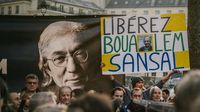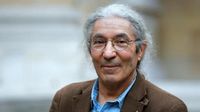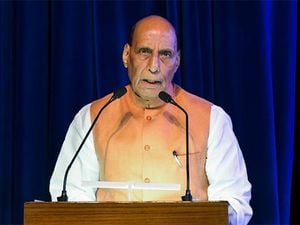On March 27, 2025, the Franco-Algerian writer Boualem Sansal was sentenced to five years in prison by the correctional court of Dar El Beida, located near Algiers. This verdict comes after Sansal had been imprisoned since November 16, 2024, on several serious charges, including "attack on national unity, outrage to constituted body, practices likely to harm the national economy, and detention of videos and publications threatening the security and stability of the country." The prosecution primarily accused him of statements made in October to the French far-right media outlet, Frontières.
The court's decision was met with immediate condemnation from various political figures in France. Christophe Lemoine, spokesperson for the French Ministry of Foreign Affairs, expressed dismay, stating, "We regret the conviction of our compatriot Boualem Sansal to a firm prison sentence." He further called for a "quick, humanitarian, and dignified resolution to this situation." This reaction underscores the escalating tensions between Algeria and France, particularly over the implications of Sansal's case.
During the trial, which took place on March 20, the prosecutor had requested a ten-year sentence. However, the court ultimately decided on a lesser penalty of five years and imposed a fine of 500,000 Algerian dinars, roughly equivalent to 3,500 euros. The reduction in the sentence was seen as a glimmer of hope by some analysts who speculated that it might facilitate a diplomatic resolution to the ongoing crisis between the two nations.
Sansal's case has become emblematic of the strained relations between Algeria and France, particularly following President Emmanuel Macron's endorsement of a Moroccan autonomy plan for Western Sahara—a territory long contested between Morocco and the Polisario Front, which seeks independence. This endorsement was perceived by Algeria as a direct affront, leading to heightened diplomatic tensions and the withdrawal of its ambassador from Paris.
In France, the reaction to Sansal's sentencing has been overwhelmingly supportive. Hundreds gathered in front of the National Assembly on March 25 to protest his imprisonment, with notable political figures in attendance, including the presidents of both the National Assembly and the Senate, Yaël Braun-Pivet and Gérard Larcher, as well as Interior Minister Bruno Retailleau. Prominent politicians like Laurent Wauquiez and Marine Le Pen voiced their outrage, with Le Pen labeling the sentencing as a "scandalous" act that effectively amounts to a life sentence given Sansal's age and health condition.
"The crime of opinion should not exist. We demand his immediate release," tweeted Mathilde Panot, head of the leftist LFI party. Similarly, Gabriel Attal, former Prime Minister, described the verdict as a "parody of justice," asserting that it was an attack on France itself.
Sansal, an 80-year-old novelist known for his critical views of the Algerian government and his opposition to Islamist extremism, had previously enjoyed some freedom of movement between France and Algeria. However, his arrest has now placed him at the center of a diplomatic storm, with many in France rallying for his release and condemning the Algerian regime for its treatment of dissenting voices.
At the heart of the accusations against Sansal is his assertion, made in Frontières, that during French colonization, the entire western part of Algeria was part of Morocco. This statement has been interpreted by Algerian authorities as an attack on national integrity, further complicating the already fraught diplomatic landscape.
During the sentencing, Sansal appeared calm despite the gravity of the situation. He was present in court without handcuffs, dressed in a green jacket, and reportedly seemed in good health, although his lawyer has raised concerns about his well-being given his age and ongoing health issues, including cancer.
The case has sparked a significant political backlash in France, with many calling for the government to take a stronger stance against Algeria. The notion of a potential presidential pardon for Sansal has been floated, with his lawyer appealing to President Abdelmadjid Tebboune for compassion in light of the writer's age and health condition.
As the diplomatic crisis deepens, the implications of Sansal's sentencing extend beyond his personal predicament. It highlights the fragile nature of Franco-Algerian relations, a dynamic that has been tested repeatedly since Algeria's independence from France in 1962. The reactions from French politicians reflect a broader commitment to defending freedom of expression and human rights, values that many believe are under threat in Algeria.
In summary, Boualem Sansal's five-year prison sentence not only marks a significant moment in his life but also serves as a flashpoint for ongoing tensions between Algeria and France. With calls for his release growing louder, the international community watches closely to see how this situation will unfold. The fate of this prominent writer remains a litmus test for the current state of freedom of expression in Algeria and the resilience of Franco-Algerian diplomatic relations.








